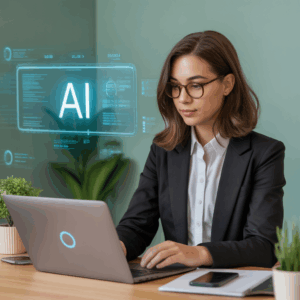Top Reasons AI Hasn’t Taken Your Job Yet

Top Reasons AI Hasn’t Taken Your Job Yet
Introduction: The Anxiety Around AI and Employment
Let’s be real—every time a new AI tool drops, there’s a wave of panic about jobs disappearing. Headlines scream about automation wiping out entire industries, and it’s easy to wonder if your role is next on the chopping block. But despite the hype surrounding AI’s impact on jobs, most of us are still clocking in every day. So, why hasn’t AI replaced you yet? This article dives into the real reasons behind the delay in job displacement, the human skills that keep you indispensable, and what the future of work might hold.
The Reality Behind AI’s Impact on Jobs: Change, Not Loss
Here’s a surprising truth: AI isn’t just a job killer; it’s a job creator too. Sure, automation threatens certain roles, but it’s also paving the way for new opportunities. According to a report from the World Economic Forum, by 2025, AI might displace around 75 million jobs worldwide. But here’s the kicker—it’s also expected to create 133 million new ones. That’s a net gain of 58 million positions, especially in fields that value creativity, critical thinking, and tech savvy.
Think about it. While some repetitive tasks are handed over to machines, humans are stepping into roles that involve strategy, innovation, and connection. So, instead of fearing AI’s impact on jobs, consider how it’s reshaping—not erasing—your career landscape.
Why AI Isn’t Replacing You—Yet
The Limits of What Machines Can Do
AI is incredible at crunching numbers or following strict rules, but it’s nowhere near perfect. Tasks that involve ambiguity, emotional depth, or human interaction? Those are still our domain. Take healthcare—AI can analyze scans or predict outcomes, but it can’t comfort a patient or make a tough ethical call like a doctor or nurse can.
Jobs like data entry or basic customer service are more at risk because they’re predictable. But if your work involves nuance or empathy, AI’s impact on jobs like yours is far less threatening—at least for now.
AI as Your Sidekick, Not Your Replacement
Here’s the thing: in most industries, AI isn’t taking over; it’s helping out. Think of it as a trusty assistant rather than a rival. In marketing, AI can spit out content drafts or analyze campaign data, but crafting a brand story that resonates? That’s still on us. In finance, algorithms handle market trends, yet clients want human advisors for trust and tailored advice.
AI’s role is often about boosting efficiency—freeing you up to focus on the bigger picture. So, rather than worrying about job displacement, see how you can leverage these tools to shine brighter in your role.
The Business Case for Keeping Humans Around
Let’s talk money and strategy. Sure, automation can cut costs, but companies aren’t always quick to ditch their workforce. Why? Because humans bring institutional knowledge, creativity, and customer trust to the table—things no algorithm can replicate. Mass layoffs for the sake of AI can backfire, damaging morale and long-term growth.
Many businesses are choosing a middle path. They’re integrating AI to streamline operations while investing in upskilling their teams. It’s a slower, safer bet than a full-on robot takeover, and it’s buying time for workers to adapt.
Which Industries Feel AI’s Impact on Jobs Most?
Not all sectors are equally affected by AI. Some are transforming fast, while others barely feel the ripple. Here’s a breakdown of how AI’s impact on jobs plays out across different fields:
| Industry/Role | AI Impact Level | Key Factors |
|---|---|---|
| Manufacturing (Routine Tasks) | High | Repetitive processes ripe for automation. |
| Healthcare (Doctors, Nurses) | Low–Medium | Empathy and complex decisions still human-driven. |
| Finance (Analysts vs. Advisors) | Medium | Data crunching automated; relationships still key. |
| Legal (Paralegals vs. Lawyers) | Medium | Document tasks automated; strategy remains human. |
| Engineering/Architecture | Low | AI aids design; human innovation still critical. |
Seeing this, where does your industry stand? If you’re in a highly repetitive field, it might be time to pivot or upskill. If you’re in a creative or interpersonal role, you’ve got a stronger foothold for now.
The Human Edge: Skills AI Can’t Touch
No matter how advanced AI gets, there are areas where humans reign supreme. These are the skills that keep AI’s impact on jobs at bay:
- Critical Thinking: Machines can process data, but humans solve messy, complex problems.
- Creativity: Coming up with original ideas or designs? That’s still our turf.
- Emotional Intelligence: Empathy, negotiation, and leadership can’t be coded.
- Contextual Understanding: Grasping cultural nuances or ethical dilemmas is beyond AI’s reach.
These strengths are your armor. Lean into them, and you’ll find that AI becomes less of a threat and more of a partner.
Barriers Keeping AI From Full Job Displacement
Technology Isn’t There Yet
AI isn’t flawless. It struggles with unpredictable situations or tasks that lack clear data. Think of a crisis scenario—AI might falter where human instinct kicks in. Plus, building reliable systems takes time, resources, and massive datasets, slowing down its rollout across industries.
Rules, Ethics, and Red Tape
Governments and organizations aren’t letting AI run wild. Strict regulations around privacy, fairness, and accountability mean companies must tread carefully. Before automating entire departments, they’ve got to clear legal hurdles and ensure they’re not risking lawsuits or public backlash. This slows down AI’s impact on jobs more than you might think.
People and Culture Push Back
Change doesn’t happen overnight in workplaces. Employees and leaders often resist full automation because it disrupts trust, loyalty, and the human element of business. Have you ever noticed how some companies cling to “the old way” even when tech could save time? That hesitation buys us breathing room to adapt.
The White-Collar Recession: A New Twist on AI’s Impact
Here’s something fresh for 2025: the so-called White-Collar Recession. Unlike traditional downturns driven by low profits, this is a weird mix of booming economies and shrinking hiring for office jobs. Routine roles like junior analysts or admin staff are being automated, yet companies are raking in cash and productivity.
What does this mean for you? If you’re in a white-collar gig, AI’s impact on jobs might not mean unemployment, but it could mean fewer openings and tougher competition. It’s a wake-up call to stand out.
Entry-Level Roles: The First to Feel the Heat
If you’re just starting out, AI’s impact on jobs hits hard. Entry-level positions often involve repetitive tasks—think data entry or basic customer support—that machines can handle cheaper and faster. Companies are trimming these roles, leaving newbies to fight for fewer spots.
But it’s not all doom and gloom. Opportunities still exist if you’re willing to learn. Pair traditional skills with AI know-how, and you’ll become a candidate who’s hard to overlook.
How to Stay Ahead of AI’s Influence on Employment
Keep Learning, Always
The fastest way to future-proof your career? Never stop growing. Get comfy with AI tools—whether it’s learning basic coding or using software to streamline your work. Mix in skills like leadership or creative problem-solving, and you’ve got a combo that’s tough to automate.
Check out online courses or workshops. Even small steps, like mastering a new app, can keep you ahead of the curve. What’s one skill you’ve been curious to pick up?
Focus on What Machines Can’t Mimic
Chase roles that demand human judgment, strategy, or connection. Think about mentoring others, shaping big-picture plans, or managing AI systems rather than competing with them. These positions play to your strengths and sidestep AI’s impact on jobs directly.
For example, if you’re in tech, don’t just code—become the person who bridges tech and client needs. That’s a spot AI can’t easily fill.
Bring Your Unique Story to the Table
Even in fields like writing or marketing, where AI churns out content, humans have an edge—our lived experiences. A machine can write a generic blog post, but it can’t share your perspective or weave in personal anecdotes. Use AI for the grunt work, then add your voice to make it unforgettable.
I’ve seen this firsthand. A client once loved a campaign not because of the data, but because the story behind it hit home. That’s the kind of impact only you can create.
The Future of Work: Teaming Up With AI
Looking ahead, the workforce isn’t about humans versus machines—it’s about teamwork. The most successful companies are already blending AI efficiency with human insight. Imagine a world where AI handles the boring stuff, and you’re free to brainstorm, connect, and innovate. Doesn’t that sound pretty great?
Leaders who get this are building cultures of reskilling and collaboration. They’re not replacing people; they’re empowering them to work smarter alongside tech. That’s the sweet spot where AI’s impact on jobs turns from threat to opportunity.
Why AI Developments Haven’t Outpaced Human Value
Here’s a little story to wrap things up. A friend of mine works in design, and a few years ago, he was sweating over AI tools that could churn out logos in seconds. But instead of panicking, he learned to use those tools to speed up drafts, then focused on pitching clients with ideas that tapped into their emotions. Today, he’s busier than ever.
AI’s progress is real, but so are the technical, social, and economic roadblocks keeping it from taking over completely. More importantly, your human skills—your ability to think deeply, feel, and connect—still matter. By staying adaptable and leaning into what makes you unique, you’re not just surviving the age of AI; you’re shaping it.
Conclusion: Your Role Still Holds Weight
So, let’s ease up on the fear of AI’s impact on jobs for a moment. It’s changing the game, no doubt, but it’s not the end of human work. Between tech limitations, ethical debates, and the irreplaceable value of human touch, your job still has a solid place in this evolving world. Focus on growth, play to your strengths, and see AI as a tool—not a rival. What do you think about this balance? Drop a comment below, share this with someone navigating the same questions, or check out our other posts on the future of work!
Sources
- “AI Jobs and International Workers’ Day,” World Economic Forum, https://www.weforum.org
- “AI Impacts in BLS Employment Projections,” Bureau of Labor Statistics, https://www.bls.gov
- “Superagency in the Workplace,” McKinsey & Company, https://www.mckinsey.com
- “The Impact of AI on Job Roles, Workforce, and Employment,” Innopharma Education, https://www.innopharmaeducation.com
- “The White-Collar Recession of 2025,” Salesforce DevOps, https://salesforcedevops.net
- “AI Article Writer,” RyRob, https://www.ryrob.com
- “Incorporating AI Impacts in BLS Employment Projections,” Bureau of Labor Statistics, https://www.bls.gov
- “AI in SEO,” Exploding Topics, https://explodingtopics.com


